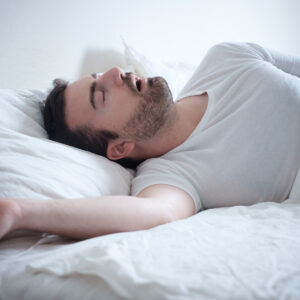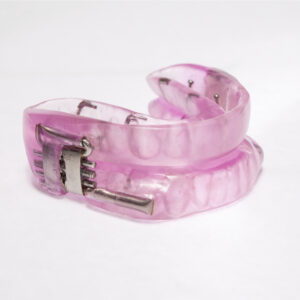Are You Sleeping Well? Treatment For Snoring & Sleep Apnea
Are you getting the sleep your mind and body need to function during the day? Are your bed partners or family unable to sleep because or you’re constantly moving or causing loud disturbances at night? If so, you may be dealing with snoring and sleep apnea.
Snoring and sleep apnea are common and have a high rate of comorbidity. Due to the far reaching possible consequences of untreated sleep apnea and snoring, getting treatment is often vital to the health, happiness, and wellbeing of you, your bed partners, and even other members of your household. At Northbridge Dental, our talented sleep dentists offer effective treatment options for loud snoring and sleep apnea.
What Causes Snoring and Sleep Apnea?
Snoring occurs when the tongue or other oral tissues near the back of the throat loosen, causing the airway to narrow and forcing air through the smaller opening. This causes the tissues to flutter, creating sound vibrations in the throat that result in snoring. When the snoring is so loud that it can be heard through walls, it’s referred to as heroic snoring.
Sleep apnea is a sleep disorder that causes intermittent recurring pauses in your breathing during sleep. There are three forms of sleep apnea:
- Obstructive sleep apnea (OSA) is the most common and is caused by the collapsing of airways blocking airflow into the lungs. The harder the sleeper tries to breathe, the tighter the airway seals. This airway obstruction persists until the brain partially awakens the person.
- Central sleep apnea (CSA) occurs when the brain fails to send signals to the body to breathe during sleep.
- Complex (or mixed) sleep apnea (MSA) is when both obstructive and central sleep apnea occur at once.
Causes of Snoring and Sleep Apnea
About half the global population snores at some point in their life and sleep apnea affects an estimated one billion people worldwide. Snoring and sleep apnea often have similar causes as well. Common causes include:
- Obesity/being overweight
- Enlarged tonsils
- Sleeping on your back
- Excessive alcohol consumption
- Smoking
- Allergies
- Congestion
Symptoms & Consequences of Snoring and Sleep Apnea
Snoring isn’t always a sign of sleep apnea, but it’s one of the most common symptoms. Other common symptoms of sleep apnea include:
- Daytime fatigue
- Waking up gasping for breath
- Snorting in your sleep
- Sore throat and dry mouth in the morning
- Headaches upon waking
- Irritability
- Difficulty concentrating
- Decreased cognitive ability
- Sexual dysfunction
If you’re experiencing any of the above symptoms, call our Alpharetta office at (678) 319-0210 or call our Roswell office at (678) 352-9890.
The Problems Caused By Untreated Snoring and Sleep Apnea
Decreased Mental and Physical Health
Failing to undergo effective treatment for your sleep apnea can lead to serious physical and mental health consequences including:
- High blood pressure
- Obesity
- Heart disease
- Type 2 diabetes
- Depression
- Insomnia
- Memory loss
Certain symptoms, such as obesity and diabetes, can exacerbate sleep apnea and snoring, which can in turn make the prior symptoms worse. This can lead to a cycle where sleep apnea and snoring can get progressively more severe the longer they go untreated.
Increased Risk of Accidents
The decrease in your cognitive ability inhibits your decision making, your reflexes, and your overall attention span. This can not only make your performance at work suffer, it makes accidents of all kinds much more likely to happen. In fact, untreated OSA is responsible for thousands of traffic fatalities every year.
Damaged Relationships
Both loud snoring and sleep apnea can lead to serious problems with your relationship. If you’re causing constant disturbances while you sleep, such as loud snoring, tossing and turning, or waking up gasping for air, chances are your bed partners aren’t getting the sleep they need.
Snoring and other sleep disturbances commonly caused by sleep apnea are the third most common reason for divorce and relationships ending. Constant sleep deprivation can lead to higher levels of stress, increasing the chance of arguments and making it much more likely that the relationship ends.
Additionally, sleep deprivation and other health issues caused by snoring or sleep apnea can decrease libido. This can cause a lack of intimacy that can also put a strain on your relationship and increase the chances of separation.
Of course, the problems caused by sleep disturbances can extend beyond your bed partners. If you experience heroic snoring, which can reach decibels louder than a vacuum, members of your household who don’t even sleep in the same room as you may hear you and suffer sleep deprivation. This means untreated snoring and sleep apnea can lead to a potential breakdown in your relationships with everyone who sleeps in your home.
Fortunately, effective therapy options for both snoring and sleep apnea can address these issues and improve your life and even the lives of those around you. Keep reading to learn more about the treatment options Northbridge Dental might offer to alleviate your symptoms.
Effective Treatment Options For Snoring and Sleep Apnea
CPAP (Continuous Positive Airway Pressure)
The most tried and true method for treating snoring and sleep apnea, CPAP, or continuous positive airways pressure machines, work by continuously delivering air pressure into your airways. The air pressure is delivered through a mask that you’ll wear while you sleep. The constant air pressure opens your airways and keeps them open, allowing you to breathe more easily.
While CPAP is effective, patients may feel uncomfortable or restricted when they wear the mask at night. This can lead to them taking the mask off during their sleep, effectively negating the treatment. Patients and their bed fellows sometimes also complain about the noise CPAP machines cause, which might contribute to sleep disturbances. If you find CPAP to be too uncomfortable or disruptive, your sleep dentist may prescribe oral appliance therapy instead.
Oral Appliance Therapy
Oral appliances are custom-made mouthpieces, designed to be comfortably worn in your mouth while you sleep. They reposition your jaw and help to prevent your soft tissues from collapsing into the back of your throat. This helps your airways stay open, so you can breathe properly and get the quality sleep you deserve.
Patients tend to prefer oral appliance therapy, because the devices are small, quiet, and comfortable. With oral appliance therapy you can sleep in almost any position, there’s no masks or potentially noisy electronics involved, and you can easily carry your treatment wherever you go.
Diet and Exercise
As surely as obesity and being overweight can contribute to snoring and sleep apnea, which can make sleep apnea and snoring worse, diet and exercise may help alleviate your symptoms. With guidance from a medical professional such as your primary care provider and a nutritionist, losing a healthy amount of weight can help shrink the soft tissues in your mouth and throat, helping to prevent them from loosening or collapsing, keeping your airways open. Please remember, your sleep dentist won’t recommend you start any diet and exercise regimen without approval from your primary care provider.
Throat Exercises
Throat exercises, also known as myofunctional therapy, specifically target the throat and mouth muscles, tightening them and preventing them from falling back into your airways while you sleep. In a clinical trial conducted for the American Journal of Respiratory and Critical Care Medicine, patients who consistently performed oropharyngeal exercises 30 minutes a day for a consecutive three months saw significant reduction in the severity and symptoms of their OSA.


